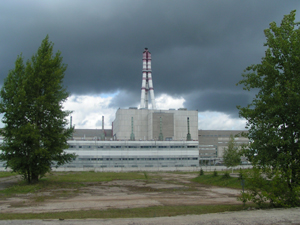Auditors criticise decommissioning of nuclear reactors in Eastern Europe
on
Auditors criticise decommissioning of nuclear reactors in Eastern Europe
The European Court of Auditors (ECA), which checks the management of EU money, has published a highly critical report on the management of the EU's financial assistance for the decommissioning of eight nuclear reactors in Bulgaria (Kozloduy), Lithuania (Ignalina) and Slovakia (Bohunice). As one "Green" member of the European Parliament puts it, the ECA's report shows 'the enormous hidden costs of nuclear energy'.
 |
| Ignalina nuclear power plant, Lithuania (source: Jan Haverkamp) |
The ECA's audit, which covers the implementation of the decommissioning programmes in Bulgaria, Slovakia and Lithuania from 1999 until the end of 2010, concludes that after €2.85bn has been committed to this from the EU budget, 'we have no idea where we are in the implementation of the programmes', as ECA officials said.
The programmes support a number of measures to mitigate the effects of the loss of nuclear power generation subsequent to the plants' early closure, as agreed with the EU during accession negotiations.
The Commission did not fully evaluate its funding schemes before putting them into action, says the ECA. It distributed funds based on the countries' own estimates of what they needed and could absorb. The schemes were considered an 'act of solidarity', says Szabolcs Fazakas, a Member of the Court and former Hungarian nuclear regulator.
Nevertheless, 'effective management requires the definition of clear lines of responsibility for the use of programmes' resources and the achievement of their objectives', his report concludes. Yet the Commission has only 'focused on the budgetary execution rather than on the extent of the progress achieved towards the programme objectives as a whole', it adds.
In other words, a lot of EU money was thrown at Bulgaria, Lithuania and Slovakia without real strategy and monitoring.
Weak management practices
The ECA s officials do not speak of fraud or leakage of EU money, but rather 'weak management practices' from the Commission's energy department. They propose a series of 'corrective actions' to make the EU expenditure worthwhile, not least establishing a genuine strategy and allocating responsibilities within a robust monitoring framework.
DG Energy spokeswoman Marlene Holzner denies the report's assertion of 'diffuse responsibilities with regard to monitoring and the achievements of programme objectives as a whole'. She insists that since 2007 DG Energy has 'put in place a procedural framework that sets specific objectives, defines roles and responsibilities and clearly defines the reporting and supervision requirements'. As for the 'delays and cost overruns' highlighted by the ECA, she says they 'are not unusual given that projects financed by the programmes are often long, complex and politically sensitive'.
The authorities in Brussels generally seem inclined to play down the report. 'We're not here to make a scandal', Fazakas told EER, but rather 'to look at improvements to be carried out, should any EU funds be earmarked for the same purpose in the next EU multiannual budget'.
That's exactly the line of the Commission: 'The report will support the work of the Commission in
| The ECA reports poor value for EU money on every one of these issues so far |
From the report it is clear that a thorough inventory of radioactive waste - a sine qua non condition for setting up a proper decommissioning plan - has not yet been made in Lithuania and Bulgaria. Nor have proper storage and disposal facilities, regarded as 'key infrastructures' by the ECA, been prepared yet.
End of infinite solidarity?
Despite these apparently poor results, the European Commission has proposed to continue the funding schemes. Holzner prefers to focus on the report's recommendations rather than its accusations of poor management, saying they are a 'valuable contribution to and solid basis for further discussions' with the other EU institutions.
Even if the recommendations from the ECA look like common sense, their implementation will not be easy. Holzner points to the 'reluctance of the concerned Member States to provisions in [the Commission's] proposal that are in accordance with the Court's recommendations'.
On top of everything else, the ECA report warns that 'the absence of sufficient funding arrangements puts the completion of the decommissioning processes at risk'. Indeed, Bulgaria, Lithuania and Slovakia want more money: in March 2011 they estimated that €2.5bn is missing to complete their programmes.
But, in a context of tough budget negotiations with EU member states, the Commission is clear: 'It is not for the EU to make up any funding shortfall,' says Holzner. The three beneficiaries are warned: further support from Brussels 'will be conditional on the concerned Member States committing adequate additional resources'.
Rebecca Harms, a German Green MEP, says the ECA's report 'underlines the enormous hidden costs of nuclear energy'. Slovakia has implemented a tax on power transmission to raise new money for decommissioning, but Bulgaria and Lithuania have no plans to raise funds themselves.


Discussion (0 comments)